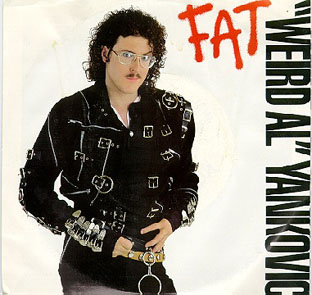
I think I have narrowed my topic down to what constitutes copyright and plagiarism in the music industry. Currently, I have looked into the legal ramifications of Weird Al Yankovic and how his parodies of popular songs have changed the music industry. There are many examples of artists being angry with his songs even though they fall under the Fair Use clause. So after talking on Tuesday I have a few more narrowed questions. What constitutes a new piece of music? Is it the changing of one music note...of 3 notes...do you have to change the whole beat? What about lyrics? Can you keep the same music but change all the words? Some of the words?
UGH!! I really don't have the slightest idea what my project will be on. I think my problem is there are so many possibilities to choose from. I am interested in online music. Everything from iTunes to Limewire to Pandora. The plagiarism idea also interests me. Perhaps there's a way to tie them both together: illegally downloading music?! I also am very interested in movies, books, and pop culture. I could go in the direction of looking at how music, movies, and books are being spoofed on cites like YouTube.
I would hate to have to resort to something on Facebook or Twitter just because everyone already knows a lot about those 2 multimedia phenomena.
My future plans at the moment include law school and a legal career. With this said Tenner's article peeked my interest in an ethical manner. First off, the term plagiosphere was beyond my limited technological vocabulary. (In an interesting note the word "plagiosphere" does not exist on the all-knowing "Wikipedia" or "Dictionary.com") So while the key term of the article hasn't culturally caught on, the ideas and concepts Tenner discusses have become very popular. Back in junior high and even early high school years (1998-2002), teaches could only give empty threats for plagarism in a paper. Yes, you had to cite sources but in all reality teachers did not have time to check everyone's resources thoroughly. Now, with the help of text-comparison software, teaches and professors can quickly check paper for verbatim and nonverbatim comparisons with original work and sources. This has not only ensured more honest work, but personally I've had to learn how to cite my sources more accurately in my texts as well as learning better research techniques. I am in awe of the ethical leap this software has forced students to take. This got me thinking of all the interesting ethical topics the class research could focus on.
1. I grew up in a family with a computer. We had internet very early in my childhood. Unfortunately, we did have dial up until I was a freshman in high school, when we upgraded to Roadrunner. My grade school had computers that we used for educational games and later for typing in Microsoft word. In high school I also had an iPod but am not familiar with iTunes. Unlike, most my friends, I didn't get a cell phone until my sophomore year in high school. I have never been one who needs all the newest gadgets and technologies, in fact, I still have a phone that can't access the internet - no Blackberry's or iPhone's for me! The internet was used a lot through junior high and high school. Most of my time on the internet was spent playing games, Instant Messaging friends, or mild research on sites like Wikipedia. My parents never really restricted my time online but I did have to share our one family computer with my older brother who had similar technical needs.
3. I do use the web in my everyday life. As a student at WVU, I am constantly checking my MIX account. I hate AOL and have canceled my account from childhood, so MIX is my only email account. I am not bold enough to say that I rule the web, but it does cater to my needs more often than not. However, when internet is down in Morgantown, or a website is not cooperating, the web falls into my "love to hate it" category. I recognize the fact that the web has changed the world for the better and my life would be drastically different without it.
